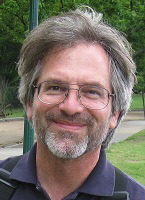Peter Smallwood is an associate professor of Biology at the University of Richmond, where he has taught since 1997. He is also coordinator of its Environmental Studies Program. Peter earned a BS in Zoology from Ohio State University, MS in Biology from University of North Carolina, and Ph.D. in Ecology and Evolutionary Biology from the University of Arizona. His dissertation and early scholarship was based in behavioral ecology, resulting in publications on the behaviors of squirrels, spiders, and falcons. In 2003-2004, he was selected as an AAAS Congressional Science Fellow. This marks a shift in focus to conservation biology, science engagement and science diplomacy, resulting in publications in Biological Conservation and Arms Control Today. In 2004-2005, he served as the first executive director of the State Department's program in Iraq for Nonproliferation of WMD Expertise. Based in Baghdad, he worked with Iraqi biologists, chemists, physicists and engineers, helping them transition out of weapons-related work. In 2006, he helped stand up the Wildlife Conservation Society's project in Afghanistan. While focused on biodiversity conservation, the project is integrated with efforts to develop economic opportunities, good governance, and civil society in Afghanistan. He returned to Kabul in 2008 to serve as director of the project (January 2008 to July 2009). During his tenure, he led successful efforts to help Afghanistan come into compliance with several international conservation treaties, establish its first officially recognized National Park, and its first Protected Species list. More recently, he has served as a consultant to Senate committees and executive branch agencies, and assisted AAAS in its science engagement programs for countries in the Broader Middle East/North African region.
USAID Profile
U.S. Global Development Lab
Operational Innovations Team Peter Smallwood is a member of the Operational Innovations Team within the U.S. Global Development Lab. His Fellowship work focuses on improving USAID operations in challenging, non-permissive environments (i.e., places where risks from conflict, civil disorder, and/or remoteness endanger personnel). He is looking for ways that USAID personnel and their implementing partners can better manage their risks while maintaining or improving their effectiveness. Dr. Smallwood is overseeing a research project funded through USAID's Higher Education Solutions Network, investigating ways that remote sensing may help track changes in permissiveness. He is particularly interested in conservation and natural resource management projects, which are increasingly important in many fragile or non-permissive regions.
|




